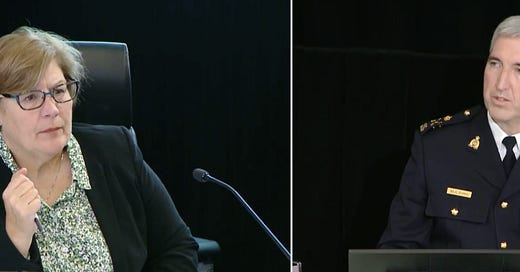RCMP accused of handling Chinese police stations "differently than other types of organized crime"
Lawyer for Chinese Canadian Concern Group suggests Ottawa is limiting RCMP to "diplomatic" approach on sensitive probes involving Beijing's transnational repression
OTTAWA, Canada — In testimony before the Hogue Commission, RCMP leaders confirmed they are struggling to lay criminal charges as they ramp up investigations into foreign interference in Canada. These investigations—deemed as “sensitive sector” probes by Ottawa—increasingly involve organized crime linked to state operations from countries such as China, India, Russia, and Iran, which are impacting diaspora communities across the nation.
“We have briefing sessions on what's happening with foreign interference, but also with what's going on in other spheres of activities related to serious organized crime, so that is new,” Deputy Commissioner Mark Flynn testified.
Commissioner Mike Duheme added that the trend of hostile states employing organized crime isn’t limited to Canada and has been recognized among allies from the U.S. and UK to Australia and France.
A significant portion of the testimony focused on the RCMP's high-profile investigations into alleged PRC "police stations" in Vancouver, Toronto, and Montreal, as well as allegations concerning India's involvement in the murder of a Sikh leader in British Columbia—a claim that India has strongly denied—and Iran’s targeting of human rights activists in Canada.
Regarding the Chinese police stations, the RCMP rejected claims raised during the hearings and publicly by several Canadian Parliamentarians, including Senator Yuen Pau Woo, that its national security investigation into alleged Chinese Communist Party (CCP) police stations had disrupted legitimate community services and activities. At the same time, the RCMP faced criticism for not aggressively investigating transnational repression, which appears to involve serious organized crime.
The Commission learned that in the fall of 2022, following international attention from the NGO Safeguard Defenders, the Canadian Security Intelligence Service (CSIS) disseminated intelligence assessing that these stations were partly created to “collect intelligence and monitor former PRC residents living in Canada as part of the PRC’s broader transnational anti-corruption, repression, and repatriation campaign.” These police stations, established by sub-national PRC authorities, reportedly provide administrative services to Chinese nationals abroad, such as driver's license renewals and household registration changes. More than two dozen services were offered through these stations, which operate in countries around the world.
“The RCMP is aware that Foreign lnterference-related activities interplay with other illegal activities, such as money laundering and intimidation of diaspora communities,” added a document summarizing Deputy Commissioner Flynn’s behind-the-scenes, classified interview with the Commission.
During the proceedings, Neil Chantler, a lawyer representing Chinese Canadians concerned with PRC interference, noted that documents revealed Canadian authorities were aware of the CCP police stations before the Safeguard Defenders report, which garnered international media attention. Flynn refused to confirm this, citing ongoing investigations.
Chantler challenged the RCMP's approach, which has focused on public engagement with the diaspora community and the disruption of overt stations allegedly providing services to immigrants while secretly collecting intelligence and surveilling Canadian residents.
"I would suggest to you that the RCMP's approach to these overseas police stations was very diplomatic,” Chantler said. “Your evidence is that the approach here was to shine a light on the problem to demonstrate to the community that the RCMP was taking the issue seriously and to build trust. We've talked about how one of the primary problems with the under-reporting of foreign interference is trust within the diaspora communities. My clients want to know why these police stations were handled differently than other types of organized crime—such as a drug lab, a money laundering operation, or a Hells Angels clubhouse. Why were these overseas Chinese police stations handled with such diplomacy?"





